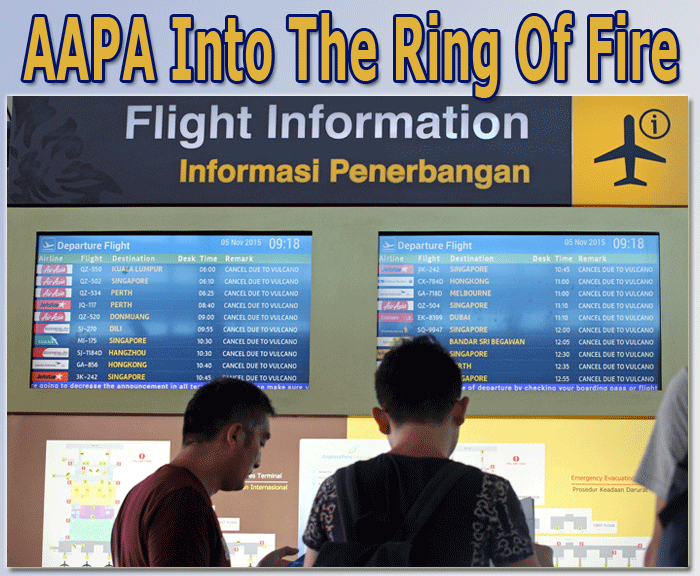
Exclusive—On
Friday this week the Association of Asia Pacific Airlines hosts its
grandly titled Assembly of Presidents meeting at the Ritz-Carlton hotel
in Bali, Indonesia. The timing is not fortuitous.
Bali’s Ngurah Rai International
Airport, one of the busiest in South East Asia due to the island’s
draw as a global tourism destination of some renown, has only been open
intermittently since the start of November. The cause? An erupting volcano
on the neighboring island of Lombok.
Mount Rinjani has been blowing dangerous,
high altitude volcanic ash clouds in the direction of Bali, which has
meant Ngurah Rai has only been open during small windows when the wind
has shifted direction away from the Island of Gods, as Bali is known.
By November 4, almost 700 flights were cancelled and the number has
since rapidly climbed.
This has left thousands of travelers
stranded for extended periods both in Bali and around Asia. It took
your correspondent six days to travel from the UK to Bali via Dubai,
Jakarta, Singapore and Surabaya and, from there, overland and finally
by ferry.
The AAPA did not respond when FlyingTypers
queried whether it was expecting its Assembly of Presidents conference
to proceed smoothly and with all participants. Of more import, apart
from the disastrous impact the ash clouds are having on tourism in Bali,
the chaos is also proving disruptive for the air freight industry and
those that rely on it.
Bali is home to the production factories
for a thriving number of internationally renowned jewelry and luxury
fashion brands and most rely on air freight to reach global export markets.
“We air freight shipments to Amazon who handle our logistics distribution
for us as orders come in,” said one jewelry exporter that mainly
sells into North America. “But at the moment we can’t replenish
our inventory in the run up to the holiday season because we can’t
get stock out on a regular basis.
“We’re also still trying
to locate some of our orders and we can’t tell if they’re
at Ngurah Rai or if they’ve been flown out already.
“There is not a lot of information
forthcoming from airlines, customs, or the airport. The integrator we
occasionally use also seems to have lost some of its usual visibility.
They can’t track and trace all the stock we have in their system.”
Asked to explain how it was easing
the impact on customers, the cargo department of Garuda Airlines, Indonesia’s
national carrier, would only say that it had made “contingency
plans” for the latest eruption.
Unfortunately for Bali’s luxury
goods export industry, and perhaps also for the AAPA’s schedule,
there is no end in sight to the eruptions on Mount Rinjani—the
last time the volcano suffered a similar event was in 2009 and it lasted
for 15 months.
To make matters worse, exporters
with factories in Bali are being hurt for the second time this year
by volcanic ash. In the summer Ngurah Rai International Airport also
suffered frequent closures due to a volcanic eruption near Mount Raung
on the tip of Java closest to Bali. This threw up vast amounts of corrosive
silica-based ash cloud and caused travel and freight disruption for
much of July and August. The mountain
is still rumbling, casting a pall over the surrounding region and threatening
to cause more chaos in the future.
One exporter of luxury handbags
based in Bali told FlyingTypers volcanic ash uncertainty was
a huge expense and risk for SME exporters that relied on air freight
to reach market. “We missed a deadline for getting samples to
Vogue in Italy during the Raung eruption, and we now have orders that
need to go out to customers but can’t due to Rinjani,” she
said. “If they can't fly out, our orders get cancelled and we're
stuck with the stock and a terrible reputation for delivering late.
“Ash clouds have a massive
impact on our business!”
They may also have a massive impact
on the AAPA’s grand event.
SkyKing




